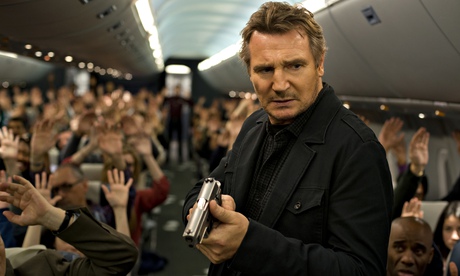
"Nervous flyer?" asks Julianne Moore after she notices Liam Neeson fiddling nervously before take off. "It never quite goes away," Neeson replies. You don't know the half of it, lady.
The last flight Neeson was on crash-landed in the Alaskan tundra, where his fellow passengers were picked off, one by one, by a pack of ravenous grey wolves. The year before that, in Unknown, Neeson landed at Berlin Tagel Airport for a biotechnology summit only to have someone steal his wife, his identity and all respect for German traffic codes. And before that we had Taken, in which Neeson had his daughter kidnapped at Charles de Gaulle Airport by Albanian slave traffickers. Neeson and foreigners don't mix. Neeson and airports don't mix. But Neeson and foreign airports is really asking for trouble. If Moore had any sense, she would have seen who was sat next to her, excused herself and caught the next flight.
Such are the lessons of the Neeson action thriller, or Neesploitation film, as it is affectionately known. The affection is genuine enough. Every year, as everyone is booking their Oscar de La Renta gowns for the red carpet at the Oscars, a studio releases a thriller in which Neeson has his daughter or wife stolen from him, thus forcing him to drive construction nails into men's thighs and say things like "I'll tear down the Eiffel tower if I have to!"
For all their brutality, the films plug into and rely upon the essential gentleness of the Neeson persona – that soft protective burr. Only Neeson could deliver a line like: "In about five seconds I am going to start beating the shit out of you" as he did in The Grey and make it sound, not like a boast, or a threat, but merely a helpful piece of information, shared in the interests of a peaceful resolution for all concerned parties.
Still setting flight attendant hearts a flutter, but too decent to flirt with the too-young tootsie in the seat behind him, Neeson enjoys a nice, relaxed rapport with Moore, whose looser, Keaton-esque side seems to come out when cast opposite noble hunks. Neeson plays Bill Marks, a retired air marshal with a drink problem and a picture of his daughter in his wallet.
In case you haven't heard: someone on the plane starts texting Neeson, threatening to kill a passenger every 20 minutes unless $150m is deposited in a bank account. I'm a sucker for aircraft thrillers that try to observe the Aristotelian unities – a small if flawed group that includes Executive Decision, Passenger 57, Flight Plan and Wes Craven's half-brilliant Red Eye – although I'm less of a fan of these screenwriter-ex-machina villains, with their overly precise demands and insinuating insights into the hero's private life. They're really little more than Post-It notes from the screenwriter saying "Villain to come … "
The general rule seems to be that the amount of threat summoned in the first half of the movie is exactly equal to the ludicrousness of the explanation tying everything together in the second. The director, Jaume Collet-Serra, has improved on the pacing of his last collaboration with Neeson, 2011's Unknown. He's also assembled quite a cast: not just Moore but Lupita Nyong'o, as a flight attendant with two or three lines to rattle off in a cockney accent; Corey Stoll as a NYPD officer also on the flight; and Downton Abbey's Michelle Dockery, whose elegantly dulcet voice threatens to mesmerize all within a 30-yard radius every time she opens her mouth. Collet-Serra shoots with a shallow depth of field, blurring everyone into shapes looming in Bill's background, whether because of the scotch he downed before the flight or his incipient paranoia is hard to tell.
For all the brushed-steel modernism of the film's cinematography, the plot pays touching tribute to Miss Marple, and in particular to the old Agatha Christie trick of ushering the entire dramatis persona into the vicarage, before allowing the finger of suspicion to fall on each in turn. Substitute an aircraft at 40,000 feet for the vicarage and Liam Neeson for Angela Lansbury and you pretty much have Non-Stop.
"I'm not a good father! I'm not a good man! But I want to save this plane!" declaims Neeson at one point, as the bodies start to pile up at his feet, and the tide of suspicion threatens to sweep him away. He's asked to roughhouse a few of the passengers and it looks a little unconvincing, to be honest: bouts of Segal-ish brutality that Neeson can't be done with fast enough. He's big and bearish, but he's never been a brute.
He's at his best striding up and down the aisles of the aircraft with that big, rolling gait of his, carving out great wads of air with his hands, barking orders, his face in Rodin-ish profile, his destiny, like Mitchum's, enlivened by a nobility far greater than the film he finds himself in – the true sign of a B-movie king.
Only once has the Neesploitation film touched greatness, in Joe Carnahan's The Grey, a keening, white-knuckled scrap of a film about life and death in the tundra that is on its way, I believe, to becoming a minor classic. Non-stop is the flimsiest of black box recorders, by contrast, that never threatens to make even intermittent sense, but it hangs together on the bulky shoulders of its star. Nothing I saw on TV this week was quite as civilised as the actor's admission, on 60 Minutes, that he was a "wee bit embarrassed" by the prospecting of beating people up at the age of 61. As if violence were something young men grow out of. Imagine.
Non-Stop is in US theatres this week

